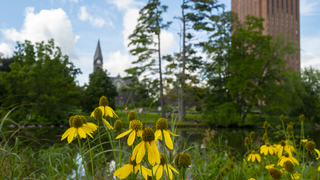UMass Amherst PART Class and Program Impacts Students Positively Over the Long Term, Survey Indicates
Students who enroll in the Positivity and Relaxation Training (PART) program finish calmer, less stressed and happier than they were when they began, according to a two-year study by the UMass Amherst Center for Program Evaluation.
The nine-week course, offered in the College of Social and Behavioral Sciences in the fall and spring semesters, helps students develop a self-care routine to manage stress, improve their outlook and enhance their quality of life.
Mike Pease, UMass Amherst health promotion specialist and certified Benson-Henry Institute (BHI) for Mind Body Medicine instructor, administers the program and teaches along with five other instructors.
“The PART program is proving to be much more than a one-credit course. Each semester we hear things like, ‘this course was a game changer for me,’ ‘it was my favorite course at UMass,’ ‘it truly changed my life,’ and more,” Pease said. “When you see the evidence and hear the testimonials it is really astonishing.”
The survey results released in May and this month are based on aggregated results from five semesters, between spring 2022 and spring 2024, and a total of 330 student participants.
Students who enrolled in the PART class demonstrated reduced stress, less distress, more stress tolerability and greater resilience. They showed improved emotional functioning, greater optimism, greater positive affect and greater mindfulness.
Students also reported less worry, lower anxiety and a decrease in depressive symptoms. Out of 21 aspects of psychosocial functioning measured, 17 showed a statistically significant change, and the magnitude of improvement ranged from 2% to 41%. For example, students reported a 42% increase in emotional functioning. Measures on the Perceived Stress Scale increased by 21%, indicating less stress experienced, and decreased by 36% on the patient health questionnaire, indicating less distress.
Since the program’s start in fall 2020, its alumni have reported greater social support and less loneliness, as Kene Orakwue can attest.
“There was definitely a sense of community, which I wasn’t necessarily expecting. I felt I was making social connections, but because it was such a small tight-knit class, and because people were sharing their experiences, we developed friendship,” said Orakwue, who earned a bachelor’s degree in public health sciences with a focus area in global women’s health and a Master of Public Health in health policy and management at UMass Amherst.
Developed at the BHI at Massachusetts General Hospital, the PART program teaches participants a variety of mind-body practices and self-care interventions including how to recognize their personal responses to stress and how to change thought patterns and emotional outlook to adaptive and positive perspectives.
Participants learn a variety of techniques in three principal areas: relaxation response techniques, positive expectancy, and healthy lifestyle behaviors. They learn meditative techniques that elicit the relaxation response, as well as techniques to improve sleep, eating and physical activity. The class also teaches students how to harness creativity, humor and appreciation to cultivate positivity and personal wellbeing.

